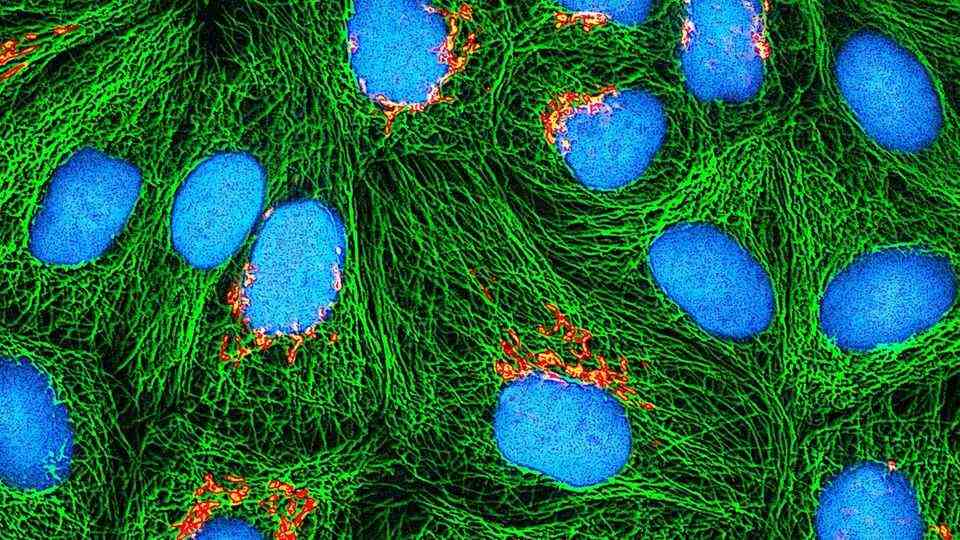Honoring the WHO
Henrietta Lacks: Your “immortal” cancer cells revolutionized medicine – but the woman herself suffered a great injustice
Henriette Lacks was 31 years old when she had to go to the hospital.
She has cervical cancer.
But in 1951, only a few hospitals were treating black people in the United States.
The American therefore has to go to the Johns Hopkins Hospital in Baltimore, Maryland.
There, tissue samples are taken from your cervix. Dr. George Otto Gey is examining the material, a doctor who has been trying to create an immortal human cell line for 30 years.
Lacks cells are his big breakthrough.
A normal cell divides an average of 40 times in its short lifetime. Henrietta Lacks’ cells, on the other hand, continue to divide today – more than 66 years after her death.
The multiple mother died of cancer in 1951. She never knew that her cells were a scientific sensation.
Even their descendants only found out about it when scientists asked them for a blood sample in the 1970s.
The fact that Lacks is never asked for permission sparked a debate about patient rights and racism. It was not required by law at the time. The accusation is nevertheless: Henrietta was exploited as a black woman.
Their cells continued to be used commercially for years – without Lack’s family knowing about it or receiving compensation.
It was not until 2013 that members of the family reached an agreement with health officials to check the cells and the DNA sequence.
The so-called “Hela” cells are used by thousands of scientists around the world to this day.
With success: the cell line helped to find drugs for polio, herpes and Parkinson’s disease.
But their origin remains controversial.
Henrietta Lacks died of cervical cancer in the early 1950s at the age of 31. Without their knowledge, researchers had removed cells from the tumor – the so-called “HeLa” cells later laid the basis for tens of thousands of studies. The World Health Organization (WHO) has now honored Lacks and found clear words.
Henrietta Lacks is considered the “mother” of modern medicine. The cells of the young woman, who died in 1951, paved the way for HPV and polio vaccines to drugs against HIV and AIDS. Behind the melodious title, however, lies an inglorious chapter of medicine: During the cancer treatment, researchers took samples from Lack’s cervical cancer tumor. They had not obtained the woman’s consent for this. Without the knowledge of Lack’s family, the cells were commercialized over a period of two decades and made available for research purposes worldwide. To date, so-called “HeLa” cells – the abbreviation is made up of the first letters of Henrietta Lacks’ name – have been used in almost 75,000 studies.
At the time, human cells could only survive outside the body for a certain amount of time. The “HeLa” cells are different: They survived and grew in the laboratory and were therefore of inestimable value for research. In this way, new methods or active ingredients could be tested on them. “HeLa” cells can still be found in almost every biotechnological laboratory today and are used, among other things, in Covid-19 research. To date, it is largely unclear what makes it so resilient.
The family found out about the “HeLa” cells by chance
It is a shock for the family members when they learn through a private coincidence that their mother’s and grandmother’s cells continue to live in laboratories around the world: The wife of Lack’s eldest son happens to meet a researcher who works with “HeLa” cells in the laboratory . When he hears the last name “Lacks”, he begins to talk about his work. At this point, Henrietta Lacks had been dead for more than 20 years. She had five children.

So-called “HeLa” cells are still used in many laboratories around the world
© BSIP / NIH / Picture Alliance
What happened to Henrietta Lacks was “wrong,” said WHO Director General Tedros Adhanom Ghebreyesus this week during a WHO ceremony in Geneva in honor of the deceased, at which family members were also present. “Henrietta Lacks was exploited. She is one of many women of color whose bodies have been abused by science. She trusted the health system so that she could be treated. But the system took something from her – without her knowledge or consent . “
On behalf of his mother, Lawrence Lacks, Henrietta Lack’s eldest son, accepted an award in recognition of his mother’s legacy and her contribution to medical science. The award is also an opportunity to honor women, especially women of color, who have made incredible but often unseen contributions to science and medicine, said WHO Director Tedros.
Initiative honors Henrietta Lacks
Lawrence Lacks described his mother as a remarkable woman who did good for the world long after her death. The family also honored Henrietta Lack an initiative founded, with which they want to preserve the memory of the donor and campaign for health equality and social justice. According to their own statements, the family has not yet received any of the income that was generated with “HeLa” cells.
Many of their grandchildren and great-grandchildren now work in medical or legal professions.

